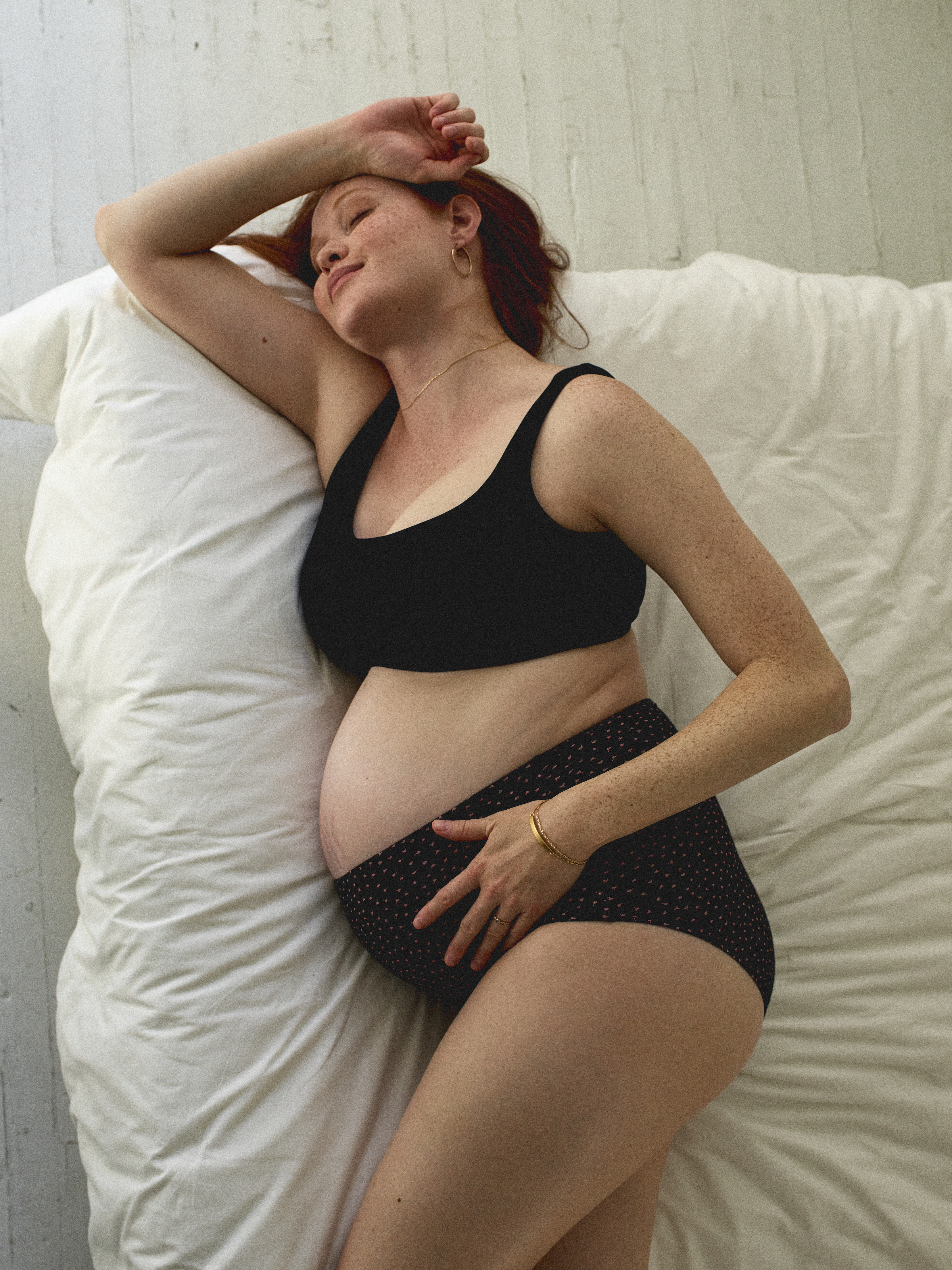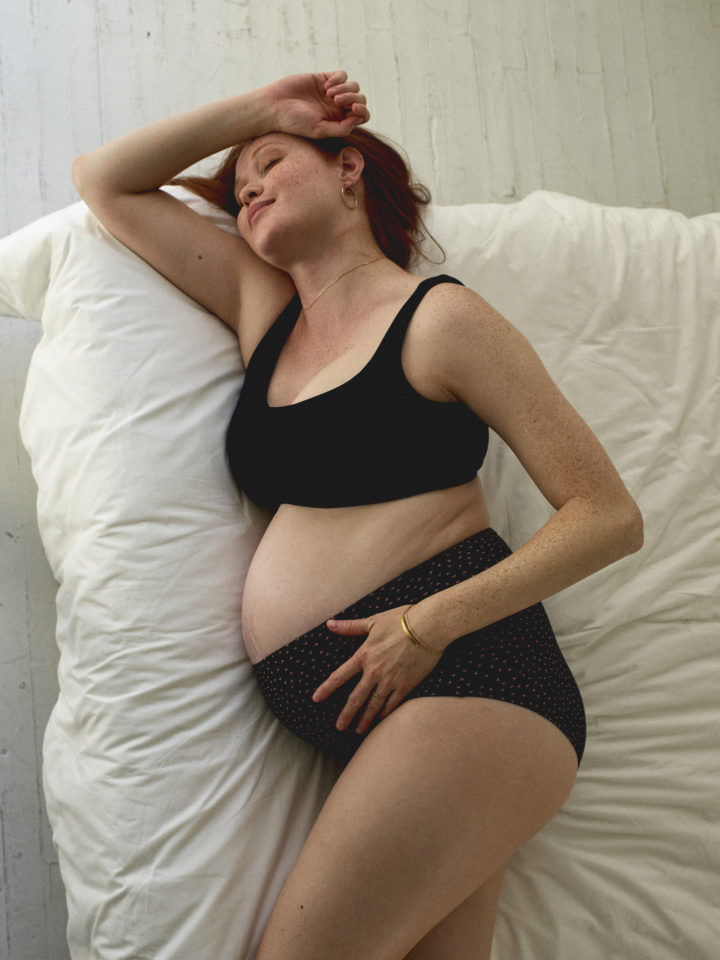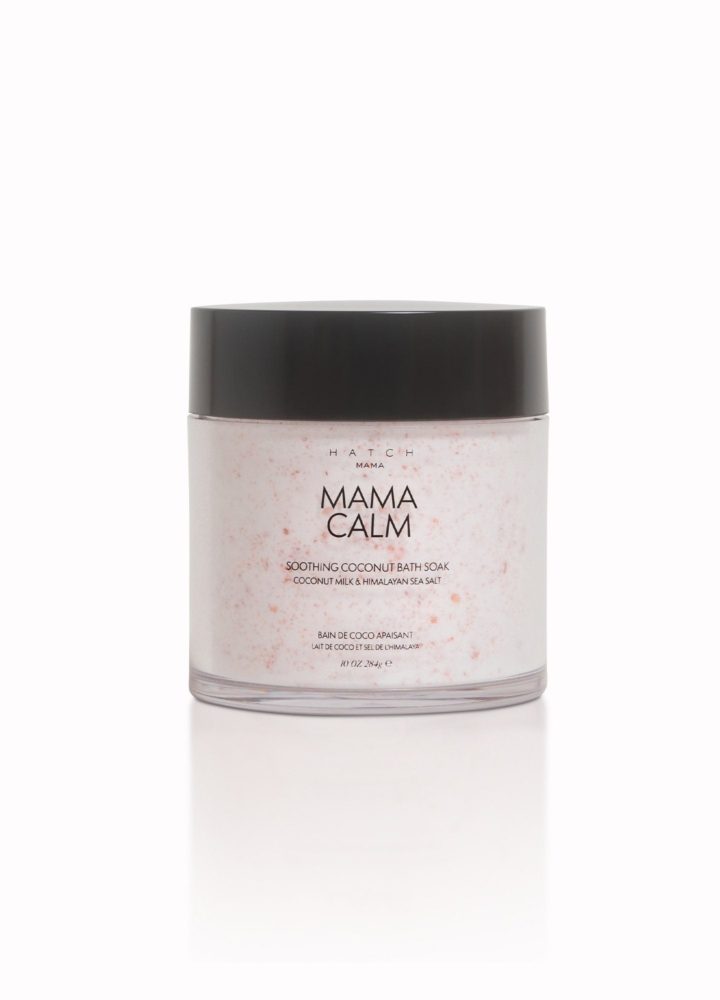Growing a baby is a full-time job, and it’s usually not even our only one! On top of being pregnant, life is full of so many other activities: working, cleaning, socializing, being a good partner or parent, and managing our own health and well-being.
After a long day trying to manage it all, there’s nothing better than throwing on your favorite set of PJs and crawling into bed. But even though pregnancy and daily activities can be exhausting, you might get into bed and still feel wide awake.
Although this is totally frustrating, it’s actually incredibly common. Doctors say that through a combination of hormonal changes and discomfort, sleep can, unfortunately, be evasive during pregnancy.
While there are some limitations on what medications and vitamins are safe during pregnancy, there are a handful of pregnancy-safe vitamins that may help you feel more relaxed and get some well-deserved Z’s.
Keep reading for answers to all of your questions about pregnancy-safe vitamins for sleeping:
Magnesium
Magnesium is responsible for maintaining a healthy immune system, regulating muscle and nerve function, promoting steady blood pressure, and keeping your bones strong. In other words, it’s an incredibly important nutrient for your body. It also can have an impact on quality sleep and optimal brain function.
Magnesium also plays a starring role in managing your blood sugar levels and energy production (hello, mid-afternoon energy crash and daytime sleepiness). About 48% of people do not get their daily dose of magnesium from their diet, and lack of magnesium has also been proven to lead to insomnia and other types of sleep deprivation.
In fact, people who regularly take a magnesium supplement are shown to fall asleep faster, sleep longer, and experience a decrease in cortisol, which is the stress hormone often responsible for staring at the ceiling and counting sheep for hours on end.
More sleep and less stress? Yes, please! With a little help from magnesium, you can get back to your natural sleep patterns and boost your wellness in no time.
Definitely consult with your doctor on the proper dosage, but generally, magnesium is considered to be mostly safe to use while pregnant. Some research has even shown that women who take a magnesium supplement are at a lower risk for certain ailments and conditions.
If you haven’t incorporated this key nutrient into your supplement line-up yet, now might be the time to chat with your healthcare team about this one.
B Vitamins
When people talk about “B Vitamins,” they’re usually referring to a group of eight different vitamins that are all essential nutrients for various functions in your body. But when it comes to reducing your hours tossing and turning in bed, the most famous B vitamins are vitamin B6 and vitamin B12.
Taking vitamin B6 in supplement form has been linked to improved sleep largely because this vitamin is responsible for the production of the neurotransmitter serotonin – AKA, the hormone that makes your body feel relaxed and happy.
Stable serotonin levels = a good night’s sleep.
In addition to promoting better sleep, Vitamin B6 has also been used to prevent nausea – Studies have shown that taking a Vitamin B6 supplement may reduce morning sickness and vomiting by 31%. We don’t know about you, but anything that will reduce our time leaning over the toilet is a win in our book.
Vitamin B12, on the other hand, is responsible for producing and maintaining the levels of melatonin in your body. Melatonin is known as the “sleep hormone,” so people who take a supplement of Vitamin B12 have been shown to improve sleep quality, help them fall asleep faster, and improve other insomnia-related symptoms. This vitamin also promotes cell health and helps whip up DNA for new cells.
Vitamin B12 is usually considered to be pregnancy-safe, but even better is that research suggests it’s an essential part of any prenatal vitamin or supplement for mamas-to-be. Keep an eye out for those supplements and incorporate them into your morning vitamin routine ASAP to reap all the good pregnancy benefits.
You can typically find b-complex vitamins in a high-quality prenatal multivitamin, along with calcium, vitamin C, and more. Try to look for a prenatal vitamin that also includes vitamin E, an essential antioxidant for your overall wellness.
Iron
Iron does a lot of heavy lifting for us. This key mineral, typically found in dark leafy greens and red meat, is responsible for producing red blood cells that carry oxygen throughout your body. Without enough iron, you run a higher risk of developing iron deficiency anemia, which can cause a whole host of side effects, ranging from dizziness and weakness to an irregular heartbeat and chest pain.
One of the most common side effects of iron deficiency anemia is complications to your sleep cycle. Unfortunately, pregnant women are at an increased risk of developing iron deficiency anemia because of the extra iron needed to accommodate increased blood volume and make hemoglobin for the baby.
In addition, an iron deficiency may be a cause of restless legs syndrome, a sleep disorder that makes it hard to stop moving while in bed.
Including a daily iron supplement has been shown to reduce symptoms of iron deficiency and anemia as well as improve your sleep quality. Iron supplements are thought to be safe for pregnancy. Iron is often recommended for pregnant women, regardless of their sleep quality and whether they’re dealing with sleep disturbances like sleep apnea or insomnia.
On average, a pregnant person should take 30 mg of iron per day to meet the demands of the larger blood volume accumulated during pregnancy. You can also get plenty of iron from food sources like whole grains and vegetables. So for better sleep and healthy pregnancy, consider an iron supplement with your Ob/Gyn (and, of course, don’t forget about those greens!).
What About Melatonin?
At this point, you’re probably wondering, what about melatonin? For non-pregnant people dealing with poor sleep, a melatonin supplement is usually the perfect solution to restless nights. But although melatonin is naturally produced by your body to maintain your circadian rhythm, it might not be the safest option for you or your baby when dealing with sleep issues.
Over-the-counter melatonin supplements have a much higher dosage than your body produces for its natural sleep cycle, and there has been minimal research done on the effects of these hormones on pregnancy. Additionally, when you’re pregnant, your placenta will produce an extra dose of melatonin — so your body may already be at its melatonin limit for healthy sleep.
Although it’s a bummer that you can’t use your nightstand stash of melatonin gummies when you’re pregnant, taking magnesium, iron, B12, and B6 could also give you the ZZZs that you want. However, as always, talk to your doctor about supplements and dosages for sleep aids before incorporating them into your routine.
Other Things You Can Do To Promote Sleep
While these supplements are scientifically proven to help you get to sleep, there are other things that can help you feel calm and sleepy that don’t require popping any pills.
Calming Exercises
Along with pregnancy comes a whirlwind of new feelings. You might feel excited about being a parent, nervous about the birthing process, baby showers, and more. Being pregnant often feels like a rollercoaster of emotions, and you have hormonal changes to thank for that. Anxious feelings are common during pregnancy, and anxiety is frequently linked to problems with sleep.
Although it’s not always recommended to take certain forms of anti-anxiety medication while pregnant, there are a lot of other pregnancy-safe anxiety management strategies you can try.
For example, meditation is one of the most popular exercises for reducing anxiety. You might feel overwhelmed starting out with meditation. It may be strange at first, but even just taking five minutes every morning and night to focus on your breathing can help reduce anxiety levels and improve your sleep.
If you aren’t sure how to begin, check out YouTube for resources. There are a ton of meditation beginner tutorials and recommendations for other meditation resources. And even if you don’t want to fully commit to a meditation practice, just sitting quietly and focusing on your breathing for a few minutes can do wonders for your anxiety and peace of mind.
If meditation isn’t really your thing, you might try other pre-bed calming rituals, like reading, journaling, or trying out an adult coloring book. The key here is something relaxing and relatively mindless to help you let go of all your pregnancy woes before bed. Don’t be afraid to try out a few different strategies before finding the one that sticks.
Pre-Bed Routine
Research has shown that having an established bedtime routine can play a huge role in helping you fall asleep (and stay asleep). Sticking to a routine also helps you maintain your sleep and wake cycle.
The most important aspect of a bedtime routine is consistency, so try to pick a half an hour window of time to get to bed each night (and then stick with it!). Then, come up with a list of three to five calming activities that you can do beforehand to signal to your body that it’s time for bed.
These activities might include meditation, skin care, putting some pregnancy-safe essential oils in your diffuser, a cup of chamomile tea, or taking a bath with our favorite pregnancy-safe bath soak.
No matter what your bedtime routine is, try to leave electronics out of it. The blue light from your phone or computer screen can block melatonin production (that hormone responsible for your sleepytime feelings), so turning off the electronics a few hours before bed is essential for getting good shuteye.
And the real secret to a bedtime routine is to stick to it every night; consistency is everything. Creating a consistent and relaxing bedtime routine has the added benefit of preparing you for nights with baby — routine will be everything for them, too (even if it doesn’t seem like it).
Sleeping Environment
It’s no secret that pregnancy can be uncomfortable, but your time in bed doesn’t have to be. Aside from creating a relaxing bedtime routine, we also recommend investing in your sleeping environment.
Make your bedroom and sleep habits as soothing as possible. If you don’t want to buy new sheets, pillowcases, or a comforter, wash them frequently, and consider using lavender-scented softener or spray to make your sleeping experience super relaxing.
Additionally, having comfortable sleepwear might make all the difference in your night of sleep. You don’t want clothing that’s too tight, digging into your skin, or made from uncomfortable materials, especially with a growing (adorable) baby bump.
Luckily, we have you covered with a wide range of comfortable and cute pajamas, including nightgowns, pajama sets, and tops designed for nursing.
Don’t spend your precious Zz’s uncomfortable — investing in a bedtime routine and comfortable bedtime wardrobe is one of the best things you can do to improve sleep quality and stop feeling like you have jet lag all the time.
Get To Sleep!
A good night’s sleep is always essential, but never more so than when you’re pregnant, and hormones are running rampant through your body. We know that pregnancy can sometimes make it difficult to fall asleep or stay asleep, so maybe some vitamins help with the heavy lifting.
And, as always, if you’re unsure about how much to take or whether supplements will interact with other parts of your pregnancy, be sure to talk to your Ob/Gyn or healthcare provider. They’ll be able to provide you with all the answers to your questions about supplements and better sleep during pregnancy.
With a combination of supplements, a relaxing bedtime routine, and a soothing sleep environment, it will be no time before you’re peacefully dozing off for a night of restful sleep.
Sources:








